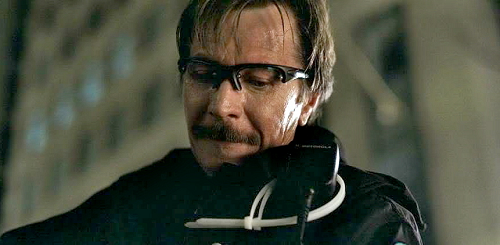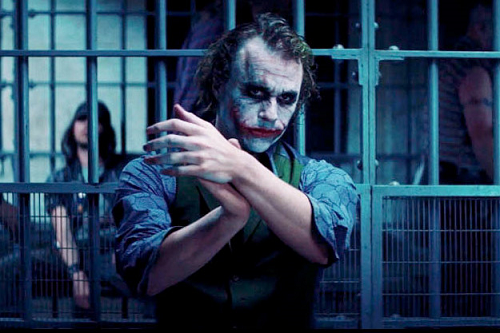Bruce Wayne and his alter ego Batman have been one of the most complex characters in pop culture, endlessly analyzed, since his first appearance 75 years ago. From comics, to television and to film, Batman and his creators have designed a layered, flawed and fascinating character. Never was this truer than in director Christopher Nolan’s brilliant Dark Knight Trilogy, beginning with 2005’s Batman Begins, continuing with 2008’s The Dark Knight and ending with 2012’s The Dark Knight Rises. Nolan essentially stripped Batman and it’s themes to their bare bones and created a world that both honored and challenged what we knew of this character. Nolan’s trilogy examines ideas of integrity, morality, chaos, heroism and faith.
**Obvious spoilers ahead for the entire Nolan series**
HEROISM
“Because he’s the hero Gotham deserves, but not the one it needs right now. So we’ll hunt him. Because he can take it. Because he’s not our hero. He’s a silent guardian, a watchful protector. A Dark Knight”
It’s an argument that’s been made before, many times but it’s still a very valid point. Jim Gordon (Gary Oldman) could easily be the unsung hero of the Dark Knight Trilogy. In Nolan’s creation he is easily the most pure of all the characters and essentially places the initial idea that there are good people who still exist, particularly after the brutal murder of his parents in Bruce Wayne’s young mind. In The Dark Knight, Gordon saves Batman and is responsible for the capture of the Joker (although the Joker wanted to be captured). Gordon is also willing to sacrifice his families trust to let the plan work. Of course, in Nolan’s world heroism is often rewarded with difficulty. By The Dark Knight Rises Jim has lost his family and is being pushed out of his job. He is a dinosaur who survived the war but is now a burden.
“A hero can be anyone. Even a man doing something as simple and reassuring as putting a coat around a young boy’s shoulders to let him know that the world hadn’t ended”.
The Dark Knight trilogy is a blueprint for building and destroying our idols. Batman Begins features Bruce creating Batman both for himself and for the city. The Dark Knight shows a city weary and all too willing to destroy their heroes, and The Dark Knight Rises shows the cost of heroism.
CHAOS/ MORALITY
“Introduce a little anarchy. Upset the established order, and everything becomes chaos. I’m an agent of chaos. Oh, and you know the thing about chaos? It’s fair”
Heath Ledger’s portrayal of The Joker is chaos personified, something that will undoubtedly remain that way for years to come. The Joker represents what Batman is always in danger of becoming. In Nolan’s trilogy we see a Bruce/Batman who is one push away from giving up his morality and descending into chaos. Some could argue that the moment Rachel is killed in The Dark Knight, is the moment both Bruce and in particular Harvey descend into real chaos and lose their thin hold on morality. Bruce barely comes out on the other side, while Harvey doesn’t survive at all.
FAITH
“Every year, I took a holiday. I went to Florence, there’s this cafe, on the banks of the Arno. Every fine evening, I’d sit there and order a Fernet Branca. I had this fantasy, that I would look across the tables and I’d see you there, with a wife and maybe a couple of kids. You wouldn’t say anything to me, nor me to you. But we’d both know that you’d made it, that you were happy. I never wanted you to come back to Gotham. I always knew there was nothing here for you, except pain and tragedy. And I wanted something more for you than that. I still do”.
Faith is a powerful theme in the Nolan trilogy. Gotham’s faith in Batman and how easily they dismiss it is not dissimilar to how the trilogy addresses heroism. Early in The Dark Knight Bruce has faith that one day he and Rachel can have a normal life and that one day Gotham won’t need Batman, allowing him to be released from the thing that he created.
In The Dark Knight Rises we see Alfred have faith that Bruce could survive or at the very least, creating a fantasy for himself where Bruce could survive and have a happy, normal life outside of Gotham. Of course, it could be argued that many of these things are blind faith and naivety. By The Dark Knight Rises, Bruce has resigned himself to the realities of the life he has chosen. We watch this realization come to him as he presumably sacrifices his life.
INTEGRITY
Batman: Beautiful, isn’t it?
Lucius Fox: Beautiful… unethical… dangerous. You’ve turned every cellphone in Gotham into a microphone.
Batman: And a high-frequency generator-receiver.
Lucius Fox: You took my sonar concept and applied it to every phone in the city. With half the city feeding you sonar, you can image all of Gotham. This is *wrong*.
Batman: I’ve gotta find this man, Lucius.
Lucius Fox: At what cost?
Batman: The database is null-key encrypted. It can only be accessed by one person.
Lucius Fox: This is too much power for one person.
Batman: That’s why I gave it to you. Only you can use it.
Lucius Fox: Spying on 30 million people isn’t part of my job description.
Some could argue that Bruce Wayne/Batman works because he is surrounded by characters who define integrity; people like Jim Gordon, Lucius Fox, or Alfred Pennyworth. Lucius Fox reluctance to spy on the people of Gotham, and the symbolism of that act, stands as one of the strongest themes in Nolan’s trilogy. His very name is the thing that destroys the machine.
Tressa Eckermann






